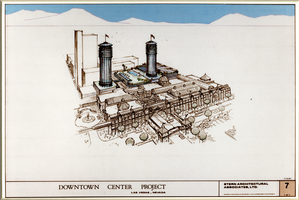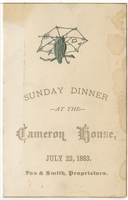Search the Special Collections and Archives Portal
Search Results
Sherrill and Samuel Coleman oral history interviews
Identifier
Abstract
Oral history interviews with Sherril and Samuel Coleman conducted by Claytee White on February 12 and 22, 2016 for the African Americans in Las Vegas: a Collaborative Oral History Project. In these interviews, Sherrill and Samuel Coleman discuss experiencing violence against African Americans in Durant, Mississippi, and discuss moving to Las Vegas, Nevada during the 1990s. The Colemans later describe their contributions with the African American community and recall the poor working conditions for African Americans in Las Vegas and throughout the United States. The two then discuss social class, American Federation of Labor (AFL-CIO), and their involvement with religious organizations.
Archival Collection
Natalie Wolf oral history interview
Identifier
Abstract
Oral history interview with Natalie Wolf conducted by Barbara Tabach on October 22, 2016 for the Southern Nevada Jewish Heritage Project. Wolf shares stories of operating the Greyhound bus station, a three-year ownership of Commercial Deli, and her long career working collections for the casino industry. She discusses working for Tropicana Hotel and Casino, and MGM Properties, including the Mirage Hotel.
Archival Collection
Paul Velez oral history interview
Identifier
Abstract
Oral history interview with Paul Velez conducted by Barbara Tabach on February 22, 2018 for the Remembering 1 October Oral History Project. In this interview, Paul Velez, a University of Nevada, Las Vegas (UNLV) campus officer, discusses his experience at the Thomas & Mack Center during the night of the October 1, 2017 mass shooting in Las Vegas, Nevada. He shares his goal of creating a safe atmosphere for the survivors and providing them with all of their needs, including helping separated survivors find their loved ones and friends. Velez also describes his move to Las Vegas in 2008 and his time with the New York City police force, talking about his experience as a first responder at Ground Zero during the 9/11 attacks. He discusses the effect these attacks have had on general and campus security measures and on him as an individual.
Archival Collection
Elaine Galatz oral history interview
Identifier
Abstract
Oral history interview with Elaine Galatz conducted by Barbara Tabach on April 22, 2015 for the Southern Nevada Jewish Heritage Project. Galatz discusses her work as a past Jewish Federation president, her marriage to renowned attorney Neil Galatz, and her career as an accomplished horsewoman.
Archival Collection
Barbara Rosenberg oral history interview
Identifier
Abstract
Oral history interview with Barbara Rosenberg conducted by Rebecca Richey on April 22, 2002 for the Public School Principalship Oral History Project. In this interview, Rosenberg reflects upon her nearly 40-year career as a teacher and administrator in New York and Nevada from the 1960s to the 2000s. She discusses her approach to school administration, and describes her regular responsibilities. She also compares her different roles as teacher, dean, assistant principal, and principal.
Archival Collection
Sarah McKenzie oral history interview
Identifier
Abstract
Oral history interview with Sarah McKenzie conducted by Brandy Campbell on October 22, 2002 for the Public School Principalship Oral History Project. In this interview, McKenzie reflects upon her career as a middle school, high school, and special education administrator in Fort Worth, Texas. She describes the process by which she initially became a teacher, and later an administrator. She discusses her experiences working in special education, and describes her typical responsibilities and challenges.
Archival Collection

Architectural drawing, downtown center project (Las Vegas), project overview, July 10, 1987
Date
Archival Collection
Description
Project overview for a proposed downtown center project in Las Vegas from 1987.
Site Name: Downtown Center
Address: Las Vegas, NV
Image
Richard Schlegel oral history interview
Identifier
Abstract
Oral history interview with Richard Schlegel conducted by Dennis McBride on June 03, 2006 for the Las Vegas Gay, Lesbian, Bisexual and Transgender Archives Oral History Project. In this interview, Schlegel discusses his involvement with Equal Rights Nevada (ERN) and the petition to amend the Nevada Constitution that prevented same-sex marriages in the early 2000s. He talks about the approach that ERN took to campaign against the petition and the role that the Coalition for the Protection of Marriage had at the time. Schlegel then describes the Marriage Protection Pledge, his experiences managing a campaign supporting marriage rights for gay couples, and explains how the outcome of the petition affected the Las Vegas, Nevada gay community.
Archival Collection
Helen and Thomas Taney oral history interview
Identifier
Abstract
Oral history interview with Thomas Taney and his wife, Helen Taney, conducted by Anthony Foley on October 22, 1972 for the Ralph Roske Oral History Project on Early Las Vegas. In this interview, Mr. Taney discusses moving to Las Vegas, Nevada to work in the factories and Mrs. Taney discusses moving to Las Vegas for adventure. Mrs. Taney talks about her music career and Mr. Taney talks about the importance of the railroad and the mining industry in Nevada. Lastly, Mr. Taney describes the changing water levels in Las Vegas as well as the growth of the city.
Archival Collection

Cameron House, menu, Sunday, July 22, 1883
Date
Archival Collection
Description
Text
